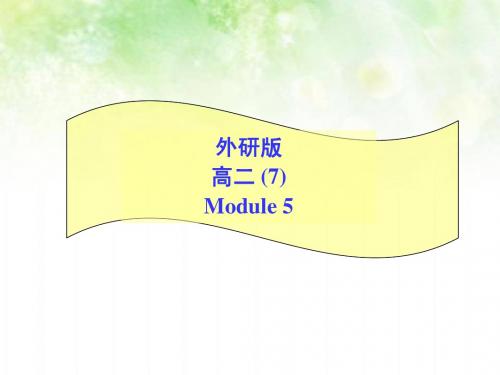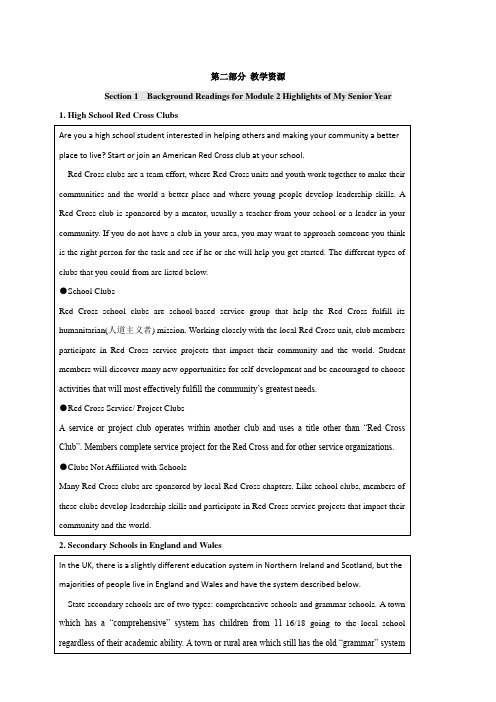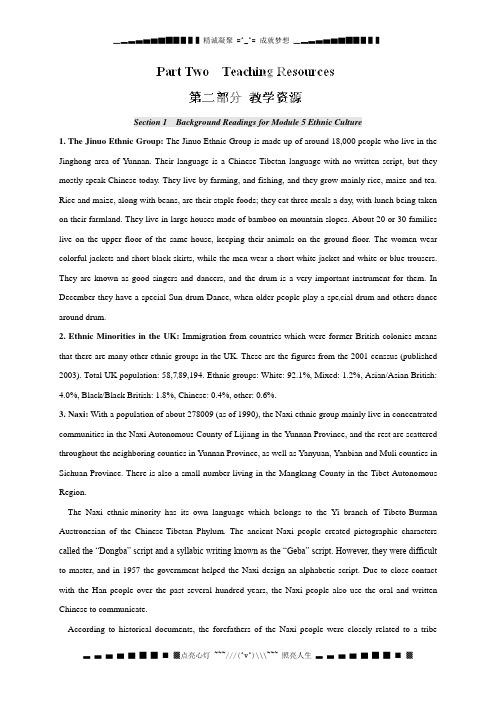陕西省南郑中学高中英语外研版选修7课件:M2P5 Listening
陕西省南郑中学高中英语外研版选修7课件:M6 The World’s Cultural Heritage P3 Language Points

汉译英
1. 我和邻居保持友好。
I maintain friendly relations with my
neighbours.
2. 警察来了维持秩序。 Police were sent for to maintain order.
3. recommend vt. a. 推荐; 介绍 recommend sth. to sb./recommend sb. sth. 向某人推荐 Would you recommend a good book to me? = Would you recommend me a good book? 你能给我推荐一本好书吗?
II. 根据汉语提示,完成句子。
⑴ A proper amount of exercise
_______________________ contributes to good health (有益健康).
⑵ He has ___________________________ made great contributions to (有很大贡献) the development of a space program. ⑶ Older people are ____________________ important contributors
外研新标准 第七册 选修7
M6
Language Points
Language points课时是对Reading课时的 补充。帮助学生巩固课文重点词汇、短语和 句型的用法,进一步扎实基础知识。教师可 根据学生预习情况选择性讲解。 (词汇的释义和用法,建议引导学生自行 查找字典等相关资料来学习,以培养其自主 学习能力。) 词汇讲解,建议采用归纳法,先尽可能多 的呈现一些相关例句,或让学生从已学课文 中查找相应例句,引导学生试着从所观察到 的语言现象中总结出词汇的意思和用法。
陕西省南郑中学高中英语:Module 5 Ethnic Culture 第一部分 教学设计(外研版选修7)

Period 1 Introduction■Goals●To learn something about the Yunnan Province●To master the new words in the introduction●To practise talking about ethnic culture■ProceduresStep 1: Warming up by a discussionIn this module, we will talk about ethnic culture. As we all know, there are so many minorities, for example, the province of Yunnan is one home to many ethnic minorities. How much do you know about Yunnan Province?“Yunnan” this word refers to “the South of Clouds”, it sounds beautiful and it is really a beautiful place. Let me tell you something about this wonderful land.Yunnan, located in the Southwest China, has a vast territory, magnificent mountains and rivers, and abundant natural resources. With an area of 390,000 square kilometers, Yunnan is the eighth largest province in China. It is an inland province, with Guizhou Province and Guangxi Zhuang Autonomous Region in the east, Tibet Autonomous Region in the northwest, and the Qinghai-Tibet Plateau in the southwest. Outside China, Y unnan borders on Burma in the west; Vietnam and Laos in the south. With a long borderline, is the main passageway connecting China with the Southeast Asian nations.In Yunnan, there are more than 6000 rivers which belong to 6 river-systems and 37 lakes with an area of over 1 square kilometer can be seen here, boasting a large number of plateau lakes. For example, the Dianchi Lake was called the bright pearl of Plateau. There are 700 hot springs as well, all of which attract lots of friends all over the world.According to our Chinese culture, a perfect place should consist of both the waterscape and the mountain. Yunnan’s mountains are also famous, including the Yulong Xueshan Mountain in Lijiang, which was regarded as one of the key scenic spots at state level. The mountains and rivers in Yunnan are both very superb landscape.Besides the landscape here, the climate in Yunnan is pleasant. As we all know Kunming is called the Spring City that’s because it’s always warm as in spring. The feature of Yunnan Climate is that it has littledifference in the seasonal temperature but considerable difference of temperature in a day. In general, the weather is favorable throughout the year, cool in summer and warm in winter, which makes Yunnan a favorable resort all the year round.Step 2: Reading the information in the boxOpen your textbooks, and turn to page 57. Let ’s look at Activity 1. Work in pairs. Say what you know about the province of Yunnan. Use the words in the box and the fact file to help you.Read through the words in the box together and repeat them chorally and individually.Read through the fact file individually and try to understand everything. Now boys and girls, do it please. Step 3: Describing what the Dai girl is wearing in the picture.NameYunnan(meaning beautiful clouds in the south) Locationmost south-western province Geographyeverything from mountains and lakes to rainforests Size394,000 square kilometers Populationabout 42 million in 2003 Rare animalsgolden monkey, Asian elephant Plantshome to half of all China ’s plant species Peoplehome to 25 ethnic minorities, most diverse region of China Capital cityKunming Natural wonders Stone Forest, Tiger Leaping Gorge, first bend of Yangtze RiverPeriod 2 Reading and vocabularyGoals●To learn something about the Naxi ethnic group and Lijiang●To practice the reading skills●To master the important words and expressions in the passage■ProceduresStep 1: Warming up by brief Introduction of LijiangLijiang is a beautiful shining jewel on the Northwest Y unnan Plateau neighboring the southeast side of the Tibetan Plateau which is considered to be the “Roof of the World”. It is impressive because of its scener y and lush vegetation. Lijiang boasts of breath-taking wonderful sights such as Jade Dragon Snow Mountain (Yulong Xueshan Mountain) (玉龙雪山) and its modern maritime glacier, the only one of its kind in the southern end of the Northern Hemisphere; Tiger Leaping Gorge(虎跳峡); the world - famous grand canyon; Lugu Lake(泸沽湖), the cultural cradle of the “Matriarchy”of the Yongning Mosuo people i n Ninglang.Lijiang Town is officially called “Dayan Town”——“Dayan” literally means a “great ink stab”, a graphic description of the town’s location on a piece of rich flatland fed by a river and surrounded by green mountains. There is no other town in China like Dayan which incorporates the folkways of so many people and the architectural styles of both north and south China. The people of Naxi, while developing their land of snow-clad mountains and turbulent rivers since ancient times, have to their cre dit the “Dong Ba Culture” seen as one of the world wonders, a culture all-embracing while unique. All these natural sceneries and these cultural treasures of the minority peoples have been continuously drawing tourists from all over the world and have recently vote Lijiang as one of the favorite destinations in China.Step 2: Before you readPlease go over the word list for this module, paying attention to the pronunciation of the word, the relationship between its pronunciation and its spelling.Step 3: While you read1. Now read the text loudly please. While you are reading the passage, please underline the new words and phrases and pay attention to the usage of them.2. Complete the following form according to the informati on you’ve got in the text.For referenceStep 4: After you readNext let us do the exercises on page 58.Find words in the passage which mean:1) a type of writing that uses pictures2) to be born from an egg3) something you can’t forget4) many small streets that are easy to get lost in5) a man who is polite and behaves well6) including many different kinds of things7) control8) a road surface made from many small round stonesAnswer the questions:1) In what way is the Yunnan landscape varied?2) Why do tourists get lost in Lijiang?3) In what way are Naxi women unuaual?4) What is unusual about the Naxi language?5) How do the Naxi believe their people started?6) Why is Naxi music famous?7) In what way does Simon say that people are all the same?Choose the correct answers1. The old town Lijiang is _____.(a) on the side of Yulong Xueshan Mountain (b) opposite Yulong Xueshan Mountain (c) covered with snow2. Naxi women ______.(a) used to inherit all property (b) inherit all property (c) have always inherited property3. The old man who Simon met ______.(a) had made translations of Naxi poems (b) read Naxi poems to Simon (c) was very lively4. The Naxi language ________.(a) is still spoken today (b) is not spoken any more (c) is almost 1,000 years today5. The Naxi men who played in the orchestra ______.(a) were all very old (b) played instruments that sounded sad (c) played music that had not changedfor centuries6. Simon now realizes that ______.(a) people are equal (b) we are all very different (c) love and friendship are very importantPeriod 3 Grammar (1) -- v-ed form as adverbial s■Goals●To learn about the v-ed form as adverbials■ProceduresStep 1: 过去分词作状语1. 过去分词作状语过去分词作状语表示被动的和完成的动作.(1) Written in a hurry, this article was not so good! 因为写得匆忙,这篇文章不是很好.【注意】written 为过去分词作状语,表示这篇文章是被写的,而且已经被写. 值得注意的是,有些过去分词因来源于系表结构,作状语时不表被动而表主动.这样的过去分词及短语常见的有: lost (迷路); seated (坐); hidden (躲); stationed (驻扎); lost / absorbed in (沉溺于); born (出身于); dressed in (穿着); tired of (厌烦).(2) Lost / Absorbed in deep thought, he didn't hear the sound.因为沉溺于思考之中,所以他没听到那个声音.2. 过去分词作状语时其逻辑主语为主句的主语,此时应注意人称一致.(1) Given another hour, I can also work out this problem.再给我一个小时,我也能解这道题.(given 为过去分词作状语,它的逻辑主语为主句主语I ,即I 被再给一个小时.)(2)_ Seen from the top of the hill, the city looks more beautiful to us.从山顶看城市,城市显得更漂亮.(seen 为过去分词作状语,表"被看",由语境可知,它的逻辑主语必须是城市,而不是"我们",因为"我们"应主动看城市.)【注意】如果过去分词作状语时,前面再加逻辑主语,主句的主语就不再是分词的逻辑主语,这种带逻辑主语的过去分词结构实际上属于独立主格结构.(1) The signal given, the bus started. 信号一发出,汽车就开动了.(the signal 是given 的逻辑主语,因此主句主语the bus 就不是given 的逻辑主语.(2) Her head held high, she went by. 她把头昂得高高地从这儿走了过去.(her head 是held high 的逻辑主语,因此主句主语she 就不再是held high 的逻辑主语.)3. 过去分词作状语来源于状语从句.(1) Caught in a heavy rain, he was all wet. 因为淋了一场大雨,所以他全身湿透了. (caught in a heavy rain 为过去分词短语作原因状语,它来源于原因状语从句Because he was caught in a heavy rain.) (2)_Grown in rich soil, these seeds can grow fast. 如果种在肥沃的土壤里,这些种子能长得很快.( grown in rich soil 为过去分词作条件状语,它来源于条件状语从句If these seeds are grown in rich soil.【注意】状语从句改成过去分词作状语时有时还可保留连词,构成"连词+过去分词"结构作状语. When given a medical examination, you should keep calm. 当你做体格检查时要保持镇定.4. 过去分词作状语的位置.过去分词可放在主句前作句首状语,后面有逗号与主句隔开;也可放在主句后面,前面有逗号与主句隔开.He stood there silently, moved to tears. = Moved to tears, he stood there silently. 他静静地站在那里,被感动得热泪盈眶.Step 2: Read the sentences and underline the V-ed forms(a) Spoken by fewer and fewer people these days, the Naxi language may disappear in the future. (because)(b) Seen from above, the old town is a maze of canals, little bridges and tiny streets. (when)(c) Passed from father to son, the music has not changed for eight centuries. (because)(d) Looked at from a distance, the Xishan Hills resemble a sleeping beauty. (when)(e) Completely rebuilt, the town would not be so interesting. (if)Step 3: Rewrite the sentences, beginning with the words given aboveStep 4: Complete the sentences with the correct form of the verbs in the box1) When _____ in spring, the hills are covered with flowers.2) _______ as one of the loveliest places in China, Yunnan is now visited by many tourists.3) _______ in the tiny streets, we decided to ask for help.4) _______ into a Naxi home, you should accept with pleasure.5) If _______ something you don’t want to eat, just refuse politely.Step 5: Write complete sentences with the correct form of the words1. discover/ only recently/ old town/ be/ still very quiet2. visit/ large numbers/ tourists/ old town/ can get very crowded3. build/ side/ mountain/ village/ be /very attractive4. cook/ traditional way/ food/ be deliciousPeriod 4 Grammar (2) -- phrasal verbs■Goals●To learn the usage of some phrasal verbs■ProceduresStep 1: General introductionThe grammar items in this unit focus on phrasal verbs. You will learn that a phrasal verb is made up of a verb plus an adverb or a preposition. You will also learn some rules to use phrasal verbs. You are expected to apply what you have learnt to practical use by finishing a conversation and a word game.Step 2: Explanation:1. Look at the following sentences. Compare them and tell the part of speech of each underlined word.He looked around and saw nothing.She is looking after the old lady carefully.In the two sentences, around is an adverb while after is a preposition.She was so ill that it seemed unlikely that she would pull through.He has gone through a difficult time recently.Here the first through is an adverb while the second through is a preposition. So we know an adverb or a preposition is used to make up a phrasal verb.2. Try to understand the meaning of the phrasal verb ‘make out’. Many phrasal verbs have more than one meaning. Do you know the meanings of the phrasal verbs in the following sentences?1) His accent gives him away as a southerner.2) He gave away most of his money to charity.3) They gave away their last chance of winning the match.4) The mayor gave away the prizes at the school sports day.5) She took me in completely with her story.6) He was homeless, so we took him in.7) Fish take in oxygen through their gills.8) I hope you’re taking in what I’m saying.9) S he pays the bills by taking in washing.omStep 3: Match the phrasal verbs with their meanings1. I didn’t come across any tigers….2. ….the Dai people make up one third of the population.3. Oh, yes, the Dai people, I’ve heard of them.4. So go on about your trip.5. A Dai family put us up in their home for a week.6. I really fell for the place.7. I’ll think it over.(a) fall in love with(b) meet or find, when you are not expecting it(c) continue(d) let someone stay in your home(e) consider(f) be a certain part of something(g) know aboutStep 4: Complete the sentences with the phrasal verbs in Activity 11. If you _____ a good book on Yunnan when you’re in the bookshop, can you buy it for me?2. I’ll ____ your suggestions but I’m not sure I agree with them.3. A friend of mine went to Yunnan and ____ a Dai woman. They’re married now.4. I know a lot about the Dai people but I’ve never _____ that custom.5. An old man offered to ___ us ____ in his house.6. Non-Han people ____ nearly 30% of Yunnan’s population.7. I’m so interested in what you’re saying. Please _____.P eriod 5 Reading and Vocabulary (2)■Goals●To get some idea about the Bai ethnic group●To draw out useful information from the text■ProceduresStep 1: Warming up by reading a passage about the Bai ethnic group.me dicinesc oncentrated in the hands of the local aristocracy at that time, the feudal lord system began to givepower from the Yuan rulers in 1381. The Ming court removed localStep 2: Before you readPlease go over the word list for this module, paying attention to the pronunciation of the word, the relationship between its pronunciation and its spelling and then review what we have learnt in the reading. Step 3: While you read1. While you are reading the passage, pay attention to the usage of new words and phrases.2. The following form will help you to understand the text.Step 4: After you readNow you have read the passage and please complete the sentences on page 66.Complete the sentences with the correct form of the words in the box.Period 6 Reading Practice■Goals●To learn experience from the story No Problem●To observe and master the use of new words and important phrases■ProceduresStep 1: Warming up by telling the main idea of the passageToday we will read a short newspaper report.Two Englishmen got a flat tyre in the middle of the jungle last week. They didn’t know what to do, as they were a long way from habitation. A local woman found them and took them to her home for tea. Some time later a young man arrived. He had a mobile phone and they called the garage. They took twenty minutes to come.Next let’s learn it in detail.Step 2: Before you readFirst let us read the new words in the passage.hammer; foolish; lame; hop; tyre; firm; jungle; soulare; waist; widow; nephew; garage; awkward; pierce;Step 3: While you readWhile you are reading, think about what is the writer’s intention.(a) to describe a meeting between travelers and villagers in the jungle.(b) to draw attention to the dangers of traveling in the jungle.(c) to describe life in a remote village in the jungle.(d) to show in an amusing way how mobile phones can be found in the most isolated places.Step 4: After you readTurn to page 68 and finish Activity 4 and 5.Complete the sentences in your own words. (Activity 5.)Period 7 Cultural Corner■Goals●To learn something about native American and Australian Aborigines●To observe and learn the usage of some important words while reading■ProceduresStep 1: RevisionWe have known something about the Chinese ethnic minorities. (the Naxi ethnic group, the Bai ethnic group and the Jinuo ethnic group) Can you tell something about these ethnic groups?Then have a discussion about these ethnic groups, the similarities and differences among the three ethnic groups. Today we’ll learn something about the Native Americans and Australia Americans.Step 2: Before you readBefore you read the passage, turn to page 69 and look at the question.Step 3: While you readWhile you are reading the passage you can think about the questions.Step 4: After you readNext you can discuss the questions with you partner. Look up the words that you don’t know in the dictionary, and then copy them to your notebook.。
陕西省南郑中学高中英语外研版选修7课件:M5 Ethnic Culture P1 Warming up

Objectives
1. To learn about ethnic culture 2. To know about the ethnic minorities in Yunnan 3. To learn about some words and phrases about ethnic culture
Yunnan
怒 僳 江 族
傈 自 治 州
迪 庆 藏族自治州 中甸
傣 族ow about people and natural wonders in Yunnan? 白族自治州
彝族自治州 壮族、苗族自治州 哈尼族、彝族自治州 傣族自治州
Read the information about Yunnan on page 57 and say something about Yunnan according to what you know. Please include the following subjects.
Yunnan is the most diverse region of
China. The minority of Yunnan includes the Yi, Dai, Lahu, Hui, Miao, Bai, Nakhi, Zang, Nu, Hani, Tai, Lisu, Va, Yao, Tibetan, Jingpo, Blang, Pumi, Achang, Jinuo, Mongolian, Derung, Manchu, Shui and Buyei.
外研新标准 第七册 选修7
M5
Ethnic Culture
Appreciation of a clip about dancing. Do you know which nationality they are?
陕西省南郑中学高中英语外研版选修7课件:M4 Music born in America P3 Language Points

拓展 有关time的几个句型: It is (high/about) time (that)…+过去时
It/This is the first/second… time that…+
现在完成时
It/This was the first/second… time that…
+过去完成时
根据汉语意思,完成句子。 1. 那是他第一次看见自己的作品出版。 It was the first time he ____ had _____ seen his work in print. 2. 你什么时候回来,我们都欢迎你。 You’re welcome to come back any _____ time you want to. ____ 3. 自从我学会下国际象棋以来,这是我第 一次赢。 It is the first time I have ____ won ____ since I learnt to play chess.
注: word 文档 点击此处链接
Individual activity
Quiz I: Complete the sentences with the correct words.
backing tracks, beat, disco music, electronic music, percussion, rap, reggae, rock music, record
1. The instrumental music behind a singer’s voice is called the _______________. backing tracks 2. Drums and similar instruments are percussion called __________. 3. ___________ Disco music is music that people dance to in clubs. 4. Songs that are spoken rather than rap sung are called ____.
外研版高中英语选修7module5精品PPT课件

orchestra ___A_.
(a) played music that had not changed for centuries
(b) were all very old
(c) played instruments that sounded sad
1
3
4
5
6
2
2. skimming
1.Follow the listening of the text and read the whole diary, pay attention to the pronunciation .
2.During your reading ,please think about the main idea of each part.
2.What is unusual about the Naxi language? The language is the only language still used which is written in hieroglyphics. 3. How do the Naxi believe their people started?
They believe that they hatched from magic eggs helped by a creature called Tabu.
4. The Naxi language __C__.
(a). is almost 1,000 years old
(b). is not spoken any more
(c). Because there is a big lake in it
高中英语外研版选修7课件:Module5SectionⅢ IntegratingSkills

①apparent adj. 显而易见的;明白的
Obviously... ②It is apparent/obvious
显而易见……;很显然……
to sb. that...
①It was apparent(apparently)that the two women knew each other. 显然这两位妇女相互认识。 ②It is apparent to everyone that he is seriously ill. 大家都明白他病得很厉害。
15.fold 16.adjust 17.furnish 18.bare
19.waist 20.nephew 21.garage
22.rainbow 23.awkward 24.gatherer
根据提示补全下列短语 1.make up 组成;构成 2.come across (偶尔)遇见 3.hear of 听说 4.think over 仔细考虑 5.put up 举起;投宿 6.have a population of 有……人口
阅读P67课文,并从四个选项中选择最佳答案 1.They saw the woman who was carrying something long and thin,
and
.
A.they were relieved to see her
B.they were scared because they thought it was a spear
理
基
础 · 自 主 初 探
巧 突 破 · 核 心
提 素 能
Section Ⅲ Integrating Skills
句 型
·
语
篇
陕西省南郑中学高中英语外研版选修7课件:M6 The World’s Cultural Heritage P5 Listening

T1: Because it’s the middle of July! G: Well, ____ even ______ though it’s the middle of July, we recommend that you take warm and waterproof clothing with you. Anyway, no __ ______ matter _____ what happens, you’re going to have a __________ marvellous time while you’re here. Even if you get wet, I promise you’ll have a day to __________. remember
G: Yes, but that’s because no one knows. Well, no one knows __ for_______. certain The whole thing is a mystery. There are some good theories, but that’s it. T2: Why was it built? G: Well, it was ________ definitely built for an important reason. T 2: And what is it? G: Pardon? T 2: What’s the _________ important ______? reason
G: Ah — good question. Well, we ______ aren’t _____, sure but we think it was built about ______ 4,000 years ago. T 2: And who built it? G: No one is completely sure. T1: I thought you said you knew everything about Stonehenge. You ____ keep saying that you don’t know! ______
陕西省南郑中学高中英语外研版选修7课件:M2P3 Language Points

A. Have fun.
B. That’s very nice of you.
C. Have a pleasure.
D. Maybe you like it
6. suit a. I found a dress that suited me perfectly, and had my hair specially done on the day of the prom. 我找到一件非常适合我的晚礼服, 毕业 舞会那天还专门去做了头发。 b. This dress suits you beautifully. 这件衣服你穿非常合适。 suit vt. 合适,使满意,适宜于
单项选择 Young people always look into the
future while old people like to
_______ Байду номын сангаасhe past. This is true of all ages.
A. look back at
B. look forward to
C. catch hold of
汉译英。 1. 你对此有意见吗? Do you have problems with that? 2. 我的英语口语没问题。
I have no problem with spoken
English.
5. have fun a. We had great fun racing each other down the ski slopes. 我们比赛着冲下雪坡,实在痛快。 b. If it is fine tomorrow, we’ll go to the great wall to have fun. 如果明天天气好,我们就去长城玩儿。 c. We have great fun playing football. 我们踢足球玩的很开心。 have fun 玩的开心 have fun doing sth. 做某事玩得很开心
外研版高中英语选修7全册优质课件

(adj.) like most things of the same type (v.) to get sth. especially by making an
8. bleed
effort (v.) to have blood flowing from your
body
9. confirm (v.) to prove that something is true
10. apologise
(v.) to tell someone that you are sorry
that you have done something
wrong
Ⅱ.根据所给词性及汉语释义写出单词 1. rely v.信任;信赖 → reliable adj.可信赖的;可靠的 2. popularity n.流行;普及→ popular adj.流行的; 普及
years ago.
F
()
3.A teacher, Naismith created a movement, which later T
became the popular basketball game. 4.William Webb Ellis wrote the rules for baseball. 5.The exact origin of basketball is unknown.
的;受欢迎的 3. selfish adj.自私的;自私自利的→ selfishness n.自私
→ selfless adj.无私的 4. nature n.性格;本性;天性→ natural adj.自然的;
本性的;本质的
5. appoin v. 任命; 委派→ appointment n.任命 t
陕西省南郑中学高中英语外研版选修7课件:M5 Ethnic Culture P3

what do you reckon
Practice
Do the exercise in your textbook and then check the answers. • Keys: 1. How come……. green with envy…… gorgeous…. I guess 2. What do you reckon….. tasty… Apparently
外研版 高二 (7) Module 5
Ethnic Culture
Period 3 Listening and Vocabulary Everyday English Speaking and Function
Listening and Vocabulary
Vocabulary
Read the following words bucket pineapple rainforest religion splash Try to explain their meanings in English
Role play
• Student A: Imagine that you have recently visited Yunnan. Tell student B about it. • Student B: Listen to Student A and use the phrases in Activity 1 to get further information. • Suggested topics: the town of Lijiang, Naxi music, Xishuangbanna,….
1
Page 62
1. It is an orange-yellow coloured fruit, cylindrical I shape, with a tuft of pointed green leaves at the top. 2. Trees, bushes, ferns and orchids are some of the common species. 3. Water, milk. 4. You should apologize.
2018-2019学年高中英语(外研版)选修7课件Module5课件(共18张)介绍和预读

2.From the passage we can know that ________. A.Lijiang has many mazes B.the Naxi ethnic group like to play cards in the street C.four rivers run around the city D.only the Naxi ethnic group live in Lijiang
1.There are 55 minorities in China. Please name as many as you can. _______________________________________________ _______________________________________________ 参考答案:The Zhuang, The Man, The Hui, The Miao, The Mongol, The Zang, etc.
1.Do you think it is important that ethnic minority cultures should continue? _______________________________________________ _____ 参考答案:①Of course, I think it's very important. ②They should continue the way they've lived for hundreds of years.
陕西省南郑中学高中英语:Module 2 Highlights of My Senior Year 第二部分 教学资源(外研版选修7)

第二部分教学资源Section 1 Background Readings for Module 2 Highlights of My Senior Year 1. High School Red Cross Clubs2. Secondary Schools in England and Wales3. Drum MajorettesSection 2 The Analysis of the Difficult Sentences from Module 2 Highlights of My Senior Year 1. I can hardly believe it, but my school life is almost over.我简直无法相信学校生活就要结束了。
在这句中,人称代词it指代抽象的事物,指的是my school life is almost over,例如:It really surprised me when they came together that cold November day.2. It’s a good thing that the exams are f inished.考试结束了,真是件好事情!本句中,句首的it都是形式主语,代替后面真正的主语that主语从句。
文中类似的句子还有1)…and it’s clear that this kind of work can really help people.……很明显,这种工作确实能帮助人。
2) It’s well-known that Americans are competitive…众所周知,美国人喜欢争强好胜。
3) For an American girl, it’s so important that you have a good time at the prom.对于美国女孩来说,在舞会上玩得快活太重要了。
陕西省南郑中学高中英语:Module 5 Ethnic Culture 第二部分 教学资源(外研版选修7)

Section 1 Background Readings for Module 5 Ethnic Culture1. The Jinuo Ethnic Group: The Jinuo Ethnic Group is made up of around 18,000 people who live in the Jinghong area of Yunnan. Their language is a Chinese-Tibetan language with no written script, but they mostly speak Chinese today. They live by farming, and fishing, and they grow mainly rice, maize and tea. Rice and maize, along with beans, are their staple foods; they eat three meals a day, with lunch being taken on their farmland. They live in large houses made of bamboo on mountain slopes. About 20 or 30 families live on the upper floor of the same house, keeping their animals on the ground floor. The women wear colorful jackets and short black skirts, while the men wear a short white jacket and white or blue trousers. They are known as good singers and dancers, and the drum is a very important instrument for them. In December they have a special Sun-drum Dance, when older people play a spe cial drum and others dance around drum.2. Ethnic Minorities in the UK: Immigration from countries which were former British colonies means that there are many other ethnic groups in the UK. These are the figures from the 2001 censsus (published 2003). Total UK population: 58,789,194. Ethnic groups: White: 92.1%, Mixed: 1.2%, Asian/Asian British: 4.0%, Black/Black British: 1.8%, Chinese: 0.4%, other: 0.6%.3. Naxi: With a population of about 278009 (as of 1990), the Naxi ethnic group mainly live in concentrated communities in the Naxi Autonomous County of Lijiang in the Yunnan Province, and the rest are scattered throughout the neighboring counties in Yunnan Province, as well as Yanyuan, Yanbian and Muli counties in Sichuan Province. There is also a small number living in the Mangkang County in the Tibet Autonomous Region.The Naxi ethnic minority has its own language which belongs to the Yi branch of Tibeto-Burman Austronesian of the Chinese-Tibetan Phylum. The ancient Naxi people created pictographic characters called the “Dongba” script and a syllabic writing known as the “Geba” script. However, they were difficult to master, and in 1957 the government helped the Naxi design an alphabetic script. Due to close contact with the Han people over the past several hundred years, the Naxi people also use the oral and written Chinese to communicate.According to historical documents, the forefathers of the Naxi people were closely related to a tribecalled “Maoniu Yi” in the Han Dynasty (206BC-220AD), “Mosha Yi” in the Jin Dynasty (265-420) and “Moxie Yi” in the Tang Dynasty (618-907). The Naxis also had a number of other names. In 1278, the Yuan Dy nasty established Lijiang Prefecture representing the imperial court in Yunnan Province. After the founding of the PRC in 1949, following consultation with the ethnic minority, it agreed upon the official name of Naxi ethnic minority.Agriculture is the main occupation of the Naxi people, together with stockbreeding and handicraft industry. The banks of the Jinsha River are heavily forested, and Y ulong Mountain is known at home and abroad as a “flora storehouse”. The extensive dense forests contain Chinese fir, Korean pine, Yunnan pine and other valuable trees, as well as many varieties of herbs.Naxi literature is rich in form and content. The Dongba script created in the seventh century by the Naxi people is the only pictographic characters extant in the world. The Dongba Scripture, a religious work written in the pictographic script, describes the various aspects of life of the Naxi people during their long transition from slavery to feudalism. It is extremely important for the study of Naxi literature, history and religion.Most Naxi peop le were followers of the Dongba religion, which is a form of Shamanism. Lamaism, Buddhism, Taoism and Christianity only have limited access to the Lijiang area.The traditional festivals include the Farm-Tool Fair in January, the God of the Rain Festival in March, and the Mule and Horse Fair in July. There are also the Spring Festival, the Qingming Festival, the Dragon Boat Festival, the Mid-autumn Festival and the Torch Festival -- all being the same as those of the Hans. 4. 丽江丽江既是一个县又一个地区的名称。
陕西省南郑中学高中英语外研版选修7课件M5EthnicCultureP2单词复习导入3.ppt

4. to be in charge of a business, etc. v. 控制,管理 run
5. a rounded stone used on the surface of
M5
Reading and
Vocabulary
Before the class
I want you to be engaged in the material. I
wNaont ynoeucteossbaereinlygatgheidnikniwnhgaatebvoeruitt is tghIeawBtttwaeintnetgtaerrydeooaduwtitsectnounestbsviioenengre,yninbgwecalotagtrseesdrd. tihnatthIesay. NdtIramioo’nkawdtuietafwnnhntaleyieecehdkcortvreaeieeiuvstratrsehyesylaa.nvtoarrwaoIieunelntorywertapdstidoahctairnittnastinhisagsttvkahikteiyvtoenhelroIefygaustatnhataehcboyatnwteo.ntigIevuemp’bastedaag.egasnrlWeeisteektdoientvetrri.engeiiyagtnsaoeloguteetdos. Wddoriiswtcenudsowswihnnagwtihcnaatcnclaamnssam.kaekeyyoouuffeeeell oorr lBeleeatartnrernsoasmttoeemnthteiiontnhg,.ibnegt.ter understanding of
- 1、下载文档前请自行甄别文档内容的完整性,平台不提供额外的编辑、内容补充、找答案等附加服务。
- 2、"仅部分预览"的文档,不可在线预览部分如存在完整性等问题,可反馈申请退款(可完整预览的文档不适用该条件!)。
- 3、如文档侵犯您的权益,请联系客服反馈,我们会尽快为您处理(人工客服工作时间:9:00-18:30)。
J: We thought about it but we didn’t do it __ ___. in ___ the end J: OK, so let’s do those three. T: Joanna? J: I’m planniቤተ መጻሕፍቲ ባይዱg to write a piece on the Big Noise. You know, I went to hear them play the other day, and I was _________ astonished by how good their songs were. I think they’ve got _________. something My feeling is that really ___ they’re going to be famous one day.
T: (laughing) You’ll never be a _______ ____ if you think like that, theatre critic Joanna. OK, Mr News Editor, what are your ideas? R: I think what we need is some __________ interesting _____, news and I’ve got some! J: What? T: Prescott’s leaving. a real J: He’s not! Oh, that’s __ ____ pity ___. Why is he going?
T: OK, this all sounds great. And how about the Opinions page, Kate? K: Well, we’ve had some great letters __, in so we can use those. But what I was ________ ___, there are a lot of thinking was foreign students who’ve come here to study for their _____ ____ of High School. My final year idea is that we ask one or two of them to write about their experiences, and _____ give _____ opinion _______ of the school. their
外研新标准 第七册 选修7
M2
Listening
Listen to a discussion.
注: 另附 word 文档。 点击此处链接
Listen again and fill in the blanks. Toby=T Joshua=J Russell=R Kate=K Alison=A T: OK, we’re all here, so ____ let’s ___ get _____. going Joshua, what exciting ideas do you have? J: What I’m planning is an article about the Senior Basketball team’s trip to California. Interview ________ the captain, and a few other players, that kind of thing. T: Sounds good. _____ What ___? else
R: That’s what my article’s going __ to __ be ______. about I’m going to interview him and ask him why. T: Ask him to stay. The school will _____ get ___ another ______ English teacher as never good as him. J: My belief is he has a health problem. R: I don’t think so. Anyway _______, we’ll see. I’m also preparing a short article on __ the new Science building.
J: ___ ___ on that. They’re amazing. I’m _____ with you T: Good. What else? J: Um, ___ ____, reviews of the the _____ usual stuff drama club play, the senior play. You know, the drama club was so __ _____ _____ much better than the senior play, it was embarrassing. I won’t say that of course. T: Why not? You should! J: No, I don’t ____ _______ people’s like hurting feelings. They all try so hard.
J: I was thinking of doing an article _________ comparing the popularity of the different sports clubs. Like ____, it’s interesting that the running club’s getting a lot more popular. T: Cool. We need one ______ more _____, piece I think. J: How about an article about Craig Dalton? He’s one of our ____ best __________. sportsmen T: Didn’t we do something like that six months ago?
